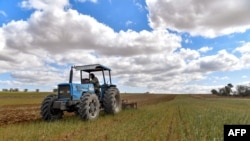"We've never seen a drought this bad," said wheat farmer Tahar Chaouachi, walking despondently through his field, 55 kilometers inland from the capital Tunis.
"It's been dry for the last four years but we expected some rain this season. Instead, it's become worse."
"Production is at zero," said Chaouachi, whose farmland lies in Beja province, a key grain production area since the days of the Roman Empire.
"The situation is unsustainable. We're losing everything we spend on seeds, fertilizer, pesticides and wages," he said. "There's no telling where things are heading."
With some Tunisian water reservoirs almost completely dry, authorities imposed emergency measures last month, rationing household supplies and banning water use for washing cars - as well as for irrigating fields.
The lack of rain has left reservoirs at historic lows of less than a third of capacity nationwide.
"This year's harvest will be catastrophic," warned Anis Kharbeche, spokesman for the farming and fishing union UTAP, predicting a fall in output of two-thirds from last year.
"We'll only be able to harvest seeds for the next season, and the country will have to import all of its needs for domestic consumption" of two types of wheat and barley, Kharbeche said.
UTAP has called on the government to urgently announce a drought and state of water "emergency".
It is also demanding a "clear strategy" to boost Tunisia's water reserves, calling for new desalination plants and quotas for at least some farm irrigation.
Tunisia devotes 80 percent of its water supply to irrigating just eight percent of its farmland, leaving the remainder to rely on increasingly scarce rainfall.
The shortages come at a critical time for Tunisia, a net importer of wheat that has been hit hard by price hikes since Russia's invasion of Ukraine, both huge cereals exporters.
Tunisia - a country of 12 million where almost every meal involves bread, couscous or other cereals-based food - needs three million tons of wheat and barley a year.
Normally around two-thirds of this comes from overseas, but with the Ukraine war showing no signs of abating, that option looks expensive or even impossible.
